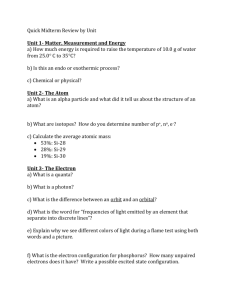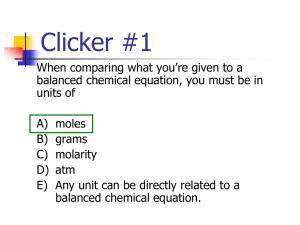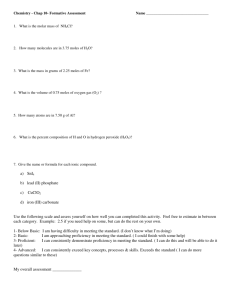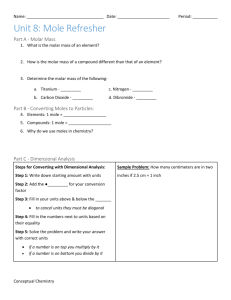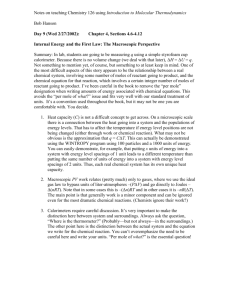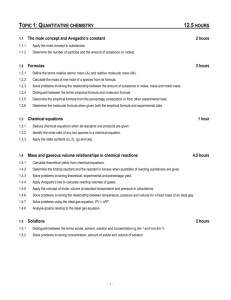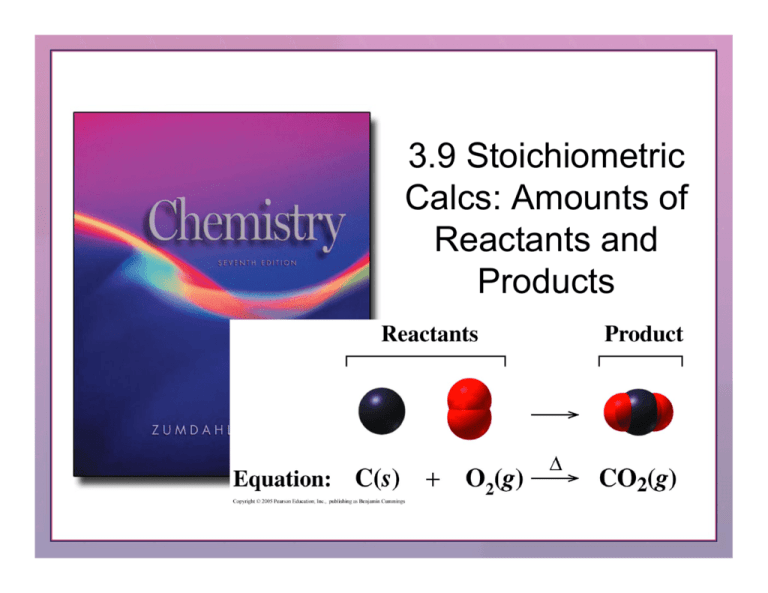
3.9 Stoichiometric
Calcs: Amounts of
Reactants and
Products
Law of Conservation of Mass
The Law of Conservation of Mass indicates that
in an ordinary chemical reaction,
• Matter cannot be created nor destroyed.
• No change in total mass occurs in a reaction.
• Mass of products is equal to mass of reactants.
Copyright © Houghton Mifflin Company. All rights reserved.
3–2
Conservation of Mass
2 moles Ag
+
1 moles S
=
1 mole Ag2S
2 (107.9 g)
+
1(32.1 g)
=
1 (247.9 g)
=
247.9 g product
247.9 g reactants
Copyright © Houghton Mifflin Company. All rights reserved.
3–3
Reading Equations In Moles
Consider the following equation:
4 Fe(s)
+ 3 O2(g)
2 Fe2O3(s)
This equation can be read in “moles” by placing the
word “moles” between each coefficient and formula.
4 moles Fe +
3 moles O2
Copyright © Houghton Mifflin Company. All rights reserved.
2 moles Fe2O3
3–4
Writing Mole-Mole Factors
A mole-mole factor is a ratio of the moles for any two
substances in an equation.
4Fe(s)
+
Fe and O2
Fe and Fe2O3
O2 and Fe2O3
3O2(g)
2Fe2O3(s)
4 moles Fe
and
3 moles O2
4 moles Fe
and
2 moles Fe2O3
3 moles O2
and
2 moles Fe2O3
Copyright © Houghton Mifflin Company. All rights reserved.
3 moles O2
4 moles Fe
2 moles Fe2O3
4 moles Fe
2 moles Fe2O3
3 moles O2
3–5
Learning Check
Consider the following equation:
3 H2(g) + N2(g)
2 NH3(g)
A. A mole-mole factor for H2 and N2 is
1) 3 moles N2 2) 1 mole N2
1 mole H2
3 moles H2
3) 1 mole N2
2 moles H2
B. A mole-mole factor for NH3 and H2 is
1) 1 mole H2
2) 2 moles NH3
3) 3 moles N2
2 moles NH3
3 moles H2
2 moles NH3
Copyright © Houghton Mifflin Company. All rights reserved.
3–6
Solution
3H2(g) + N2(g)
2NH3(g)
A. A mole-mole factor for H2 and N2 is
2) 1 mole N2
3 moles H2
B. A mole-mole factor for NH3 and H2 is
2) 2 moles NH3
3 moles H2
Copyright © Houghton Mifflin Company. All rights reserved.
3–7
Calculations with Mole Factors
How many moles of Fe2O3 can form from 6.0 mole O2?
4Fe(s)
+
3O2(g)
Relationship:
2Fe2O3(s)
3 mole O2 = 2 mole Fe2O3
Write a mole-mole factor to determine the moles of Fe2O3.
6.0 mole O2 x
2 mole Fe2O3 = 4.0 mole Fe2O3
3 mole O2
Copyright © Houghton Mifflin Company. All rights reserved.
3–8
Guide to Using Mole Factors
Copyright © Houghton Mifflin Company. All rights reserved.
3–9
Learning Check
How many moles of Fe are needed for the reaction of
12.0 moles O2?
4 Fe(s)
+
3 O2(g)
2 Fe2O3(s)
1) 3.00 moles Fe
2) 9.00 moles Fe
3) 16.0 moles Fe
Copyright © Houghton Mifflin Company. All rights reserved.
3–10
Solution
3) 16.0 moles Fe
12.0 moles O2 x
4 moles Fe = 16.0 moles Fe
3 moles O2
Copyright © Houghton Mifflin Company. All rights reserved.
3–11
Steps in Finding the Moles and Masses in a
Chemical Reaction
Copyright © Houghton Mifflin Company. All rights reserved.
3–12
Moles to Grams
Suppose we want to determine the mass (g) of NH3
that can form from 2.50 moles N2.
N2(g) + 3 H2(g)
2 NH3(g)
The plan needed would be
moles N2
moles NH3
grams NH3
The factors needed would be:
mole factor NH3/N2 and the molar mass NH3
Copyright © Houghton Mifflin Company. All rights reserved.
3–13
Moles to Grams
The setup for the solution would be:
2.50 mole N2 x 2 moles NH3 x 17.0 g NH3
1 mole N2
1 mole NH3
given
mole-mole factor
molar mass
= 85.0 g NH3
Copyright © Houghton Mifflin Company. All rights reserved.
3–14
Learning Check
How many grams of O2 are needed to produce
0.400 mole Fe2O3 in the following reaction?
4 Fe(s)
+
3 O2(g)
2 Fe2O3(s)
1) 38.4 g O2
2) 19.2 g O2
3) 1.90 g O2
Copyright © Houghton Mifflin Company. All rights reserved.
3–15
Solution
2) 19.2 g O2
0.400 mole Fe2O3 x 3 mole O2 x 32.0 g O2= 19.2 g O2
2 mole Fe2O3 1 mole O2
mole factor
Copyright © Houghton Mifflin Company. All rights reserved.
molar mass
3–16
Calculating the Mass of a Reactant
The reaction between H2 and O2 produces 13.1 g water.
How many grams of O2 reacted?
2 H2(g)
+ O2(g)
2 H2O(g)
?g
13.1 g
The plan and factors would be
g H2O
mole H2O
mole O2
g O2
molar
mole-mole
molar
mass H2O
factor
mass O2
Copyright © Houghton Mifflin Company. All rights reserved.
3–17
Calculating the Mass of a Reactant
The setup would be:
13.1 g H2O x 1 mole H2O x 1 mole O2 x 32.0 g O2
18.0 g H2O
2 moles H2O 1 mole O2
molar
mole-mole
molar
mass H2O
factor
mass O2
= 11.6 g O2
Copyright © Houghton Mifflin Company. All rights reserved.
3–18
Learning Check
Acetylene gas C2H2 burns in the oxyacetylene torch
for welding. How many grams of C2H2 are burned if
the reaction produces 75.0 g CO2?
2 C2H2(g) + 5 O2(g)
4 CO2(g) + 2 H2O(g)
1) 88.6 g C2H2
2) 44.3 g C2H2
3) 22.2 g C2H2
Copyright © Houghton Mifflin Company. All rights reserved.
3–19
Solution
3) 22.2 g C2H2
2 C2H2(g) + 5 O2(g)
4 CO2(g) + 2 H2O(g)
75.0 g CO2 x 1 mole CO2 x 2 moles C2H2 x 26.0 g C2H2
44.0 g CO2
molar
mass CO2
4 moles CO2
mole-mole
factor
1 mole C2H2
molar
mass C2H2
= 22.2 g C2H2
Copyright © Houghton Mifflin Company. All rights reserved.
3–20
Calculating the Mass of Product
When 18.6 g ethane gas C2H6 burns in oxygen, how
many grams of CO2 are produced?
2 C2H6(g) + 7 O2(g)
18.6 g
4 CO2(g) + 6 H2O(g)
?g
The plan and factors would be
g C2H6
mole C2H6
molar
mass C2H6
mole CO2
mole-mole
factor
Copyright © Houghton Mifflin Company. All rights reserved.
g CO2
molar
mass CO2
3–21
Calculating the Mass of Product
2 C2H6(g) + 7 O2(g)
4 CO2(g) + 6 H2O(g)
The setup would be
18.6 g C2H6 x 1 mole C2H6 x 4 moles CO2 x 44.0 g CO2
30.1 g C2H6
2 moles C2H6 1 mole CO2
molar
mass C2H6
=
mole-mole
factor
molar
mass CO2
54.4 g CO2
Copyright © Houghton Mifflin Company. All rights reserved.
3–22
Learning Check
How many grams H2O are produced when 35.8 g C3H8
react by the following equation?
C3H8(g) + 5 O2(g)
3 CO2(g) + 4 H2O(g)
1) 14.6 g H2O
2) 58.4 g H2O
3) 117 g H2O
Copyright © Houghton Mifflin Company. All rights reserved.
3–23
Solution
2) 58.4 g H2O
C3H8(g) + 5 O2(g)
3 CO2(g) + 4 H2O(g)
35.8 g C3H8x 1 mole C3H8
44.1 g C3H8
molar
mass C3H8
x 4 mole H2O x 18.0 g H2O
1 mole C3H8 1 mole H2O
mole-mole
factor
molar
mass H2O
= 58.4 g H2O
Copyright © Houghton Mifflin Company. All rights reserved.
3–24

